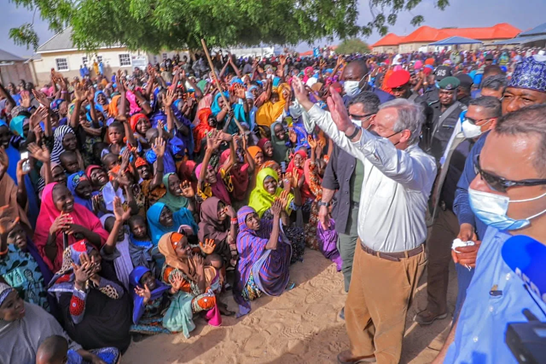Wilton Park, with the support of the Foreign, Commonwealth and Development Office, organised a three day high-level stakeholder conference on key next steps toward comprehensive regional solutions in the Lake Chad Basin region. The conference was organised by the UK in its role as co-Chair of the International Support Group to the Regional Strategy for Stabilisation, Recovery and Resilience of the Boko Haram affected regions of the Lake Chad Basin (RSS); and in light of the recommendations of the third Lake Chad Basin Governors’ Forum on the urgency of regional harmonisation of reintegration approaches, the categorisation and screening of ex-associates, and the mainstreaming of transitional justice into the reintegration process. The conference brought together key stakeholders and decision-makers from the four affected countries at national and sub-national levels, international experts in Disarmament, De-radicalisation, Rehabilitation (DDR) and transitional justice, lead UN agencies and key donors.
In order to capitalise on recent mass defections by members of Violent Extremist Organisations (VEOs) and their increasing willingness to reintegrate, the core goals of the conference were to:
- Draw on evidence and best practice in considering how to strengthen DDR approaches and implementation across the region, as well as exploring how to work towards a comprehensive survivor-centric transitional justice framework that includes some element of accountability for those who have committed atrocities; and
- Build coherence among key government agencies from the four LCB countries as well as momentum and mobilisation from the wider international community to give further support to DDR and transitional justice initiatives.
LCB countries and their partners strongly recognised the urgent need to seize the current window of opportunity presented by recent mass defections and establish credible and effective pathways for combatants to exit the conflict and reintegrate. The discussions also recognised the key role of the Lake Chad Basin Regional Strategy for Stabilisation Recovery and Resilience (RSS) as an overarching structure to guide and coordinate DDR and transitional justice approaches in the region.
At the conference, LCB countries presented on their own approaches to DDR, with discussions focused on the novel community-based approaches to DDR currently under development. These proposed approaches are community based in multiple ways: in the sense that individuals and families are envisaged to go through this process as a community and in the sense that the process itself will have the communities of reintegration at the heart of it. Governor Babagana Umara Zulum of Borno State, Nigeria, delivered a conference keynote address setting out in detail the principles and modalities of this approach and leading policymakers from Cameroon, Chad and Niger presented their own best practices and evolving approaches to DDR. Central to community-centred DDR approaches is rebuilding trust between communities and their own government as well as between ex-combatants and reintegration communities, the state and the military. In order to support greater integration and coherence of DDR approaches across the LCB, the conference discussions recommended utilising existing regional structures, in particular the Lake Chad Basin Governors Forum.
One proposal developed by the conference centres on the finalisation and endorsement of the Cross Border Return and Reintegration (CBRR) policy by the Lake Chad Basin Commission. A second recommendation is for the establishment of a Standing Committee under the Lake Chad Basin Commission RSS Secretariat comprising national and sub national stakeholders, supported by technical experts, for regional DDR. The Standing Committee could focus initially on the development of common standards on screening and prosecution.
Ensuring sustainable funding for DDR interventions is a critical challenge, with the needed scale very substantial. The conference discussions encouraged national governments and the international community to develop strategies to ensure this funding. There is a need for all four countries to invest national resources in developing DDR approaches. International donors are keen to support this effort but will need to see a clear legal framework, robust screening mechanisms, and have trust that all interventions are human rights compliant.
The conference strongly recognised transitional justice as a fundamental component of the essential reintegration effort. It was recommended that LCB countries, supported by their international partners, work together to develop a regional approach to transitional justice that is flexible to the varying requirements of different states and communities, drawing on the 2019 AU Policy on Transitional Justice. This regional approach could be agreed at the next Lake Chad Basin Governors Forum.
It is also important to strengthen the CSO network on reintegration in the Lake Chad Basin, an objective that the RSS secretariat could take forward. A linked proposal emanating from the conference is for the development of a regional youth service to address the underlying causes of conflict and build inter-regional linkages. Conference delegates agreed that all DDR and transitional justice approaches need to be inclusive of women, children, different ethnic and religious communities and marginalised groups. They should also be survivor-centred, and survivors should be brought into the development of policy at the earliest stages. CSOs need to play a vital role both in the implementation and documentation of DDR and transitional justice initiatives.
In association with the UK’s Foreign, Commonwealth and Development Office
Wilton Park reference number: WP2035
